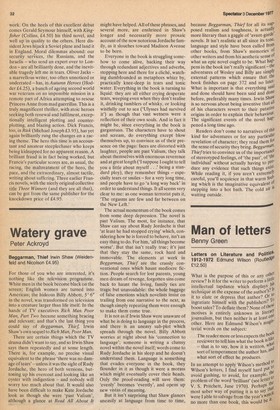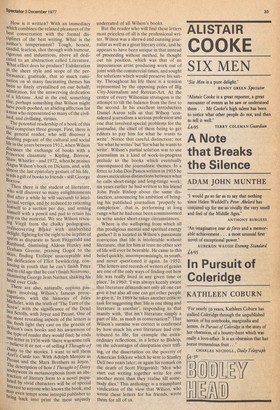Man of letters
Benny Green
Letters on Literature and Politics, 1912-1972 Edmund Wilson (Routledge £12.50) What is the purpose of this or any other review? Is it for the writer to perform a intellectual tapdance which displays technique at the expense of the author's? it to elate or depress that author? Or Ingratiate himself with the publishers? 1.° boost sales? To deflate them? None dales! motives is entirely unknown in Maar; journalism, but then neither is at least one other. Here are Edmund Wilson's We terial words on the subject: The reader more or less expects the reviewer to tell him what the book is In't that is to say, how it is written, Aw11°,1 sort of temperament the author has, arl"" what sort of effect he produces.
In an attempt to apply Wilson's method tth° Wilson's letters, I find myself hard put re avoid gushing, to avoid, for example, 11,10 problem of the word 'brilliant' (see letter,',„ V. S. Pritchett, June 1970). Perhaps tovi most sober way of putting it is to say were I able to salvage from the year's virc.c no more than one book, this would be It' How is it written? With an immediacy Which combines the relaxed pleasures of the best conversation with the formal disciplines of the best writing. What is the author's temperament? Tough, honest, candid, fearless, shot through with humour, rigorous and industrious, above all dedicated to an abstraction called Literature. What effect does he produce? Exhilaration at the sheer style and scope of the performance; gratitude, that so much rumination on sti many fascinating themes has been so finely crystallised on our behalf; admiration, for the unswerving dedication of a lifetime. And in the end; something else, perhaps something that Wilson might have pooh-poohed, an abiding affection for 'man who represented so many of the civilised, and civilising, virtues. The potential readership of a book of this kind comprises three groups. First, there is the general reader, who will discover a dazzling pageant of the cultural and social life in the years between 1912, when Wilson discusses the exchange of books with a Princeton classmate Kipling, Borrow, Shaw, Whistler-and 1972, when he praises Angus Wilson's book on Dickens, and, with almost the last epistolary gesture of his life, sends a gift of books to friendsstill George Borrow.
Then there is the student of literature, Wsho will discover so many enlightenments that after a while he will succumb to intellectual vertigo, and be reduced to rationing himself to a section per day, and arming himself with a pencil and pad to retain his g, rip on the material. We see Wilson rescuing Virgil from the chalky pedagogues, rediscovering Blake with unabashed delight, fighting for the right to be in print of spirits as disparate as Scott Fitzgerald and Rimbaud, dismissing Aldous Huxley and Graham Greene, praising Gogol to the Skies, finding Trollope unacceptable and the deification of Eliot bewildering, confessing in youth that he can't finish Pater and in old age that he can't finish Nostromo, dismissing George Jean Nathan, shaking his head over Gide. There are also, naturally, copious pas sages involving Wilson's famous preoccuPations, with the histories of Jules sMichelet, with the truth of 'The Turn of the ,,crew', with the significance of the Dead '3ea Scrolls, with Joyce and Proust. One of t!le most revealing aspects of the letters is tne fresh light they east on the genesis of Wilson's own books and his awareness of the type of reader they would find; he ends one letter in 1936 with 'there was some talk believe it or not of selling I Thought of nisY to the movies. I want to sell them Castle too. With Adolph Menjou as Proust and the Marx Brothers as Joyce.' The description of how I Thought of Daisy tunderwent its metamorphosis from an absiraction of literary form to a novel popu.ated by vivid characters will be of special interest to anyone who knows the book, and max, aY even tempt some intrepid publisher to ring back into print the most unjustly underrated of all Wilson's books.
But the reader who will find these letters most priceless of all is the professional writer. Wilson was a shrewd and cunning journalist as well as a great literary critic, and he appears to have been unique in that instead of proceeding without method, he thought out his position, which was that of an impecunious artist producing work out of joint with the commercial times, and sought for solutions which would preserve his sanity. Throughout his life there is a tension represented by the opposing poles of Big City-Journalism and Retreat-Art, At the centre of every Wilsonian stratagem is the attempt to tilt the balance from the first to the second. In his excellent introduction Daniel Aaron tells us that Wilson 'considered journalism a serious profession and one that involved special problems for the journalist, the chief of them being to get editors to pay him for what he wants to write'. Notice that careful distinction; not 'for what he writes' but 'for what he wants to write'. Wilson's partial solution was to use journalism as a kind of work-in-progress prelude to the books which eventually encompassed the journalistic themes. In a letter to John Dos Passos written in 1935 he draws meticulous distinctions between what he calls short-range and long-range work; six years earlier he had written to his friend John Peale Bishop about the same distinction, announcing his ambition of bringing his published journalism 'properly to completion', that is, performing at long range what he had once been commissioned to write under short-range circumstances.
Where is the wellspring from which all this prodigious mental and spiritual energy gushes? It is located in Wilson's passionate conviction that life is intolerable without literature, that for him at least no other sort of life will ever be bearable. He came to this belief quickly, uncompromisingly, in youth, and never questioned it again. In 1952: 'The letters and records of writers of genius are one of the only ways of finding out how life was really lived in any given time or place.' In 1960: 'I was always keenly aware that literature demands not only all one can give it but also all one can get other people to give it.' In 1969 he takes another critic to task for suggesting that 'life is one thing and literature is another', responding to that inanity with, 'But isn't literature simply a part of life, as much as conversation?' That Wilson's surmise was correct is confirmed by how -much his own literature had contributed to life, for example the extraordinary reflections, in a letter to Bishop, on the advantages of dissipation over trifl ing, or the dissertation on the poverty of American folklore which he sent to Stanley Dell two years later; or again his remark on the death of Scott Fitzgerald: 'Men who start out writing together write for one another more than they realise till somebody dies.' This anthology is a triumphant vindication of the view that Wilson, who wrote these letters for his friends, wrote them for all of us.











































 Previous page
Previous page